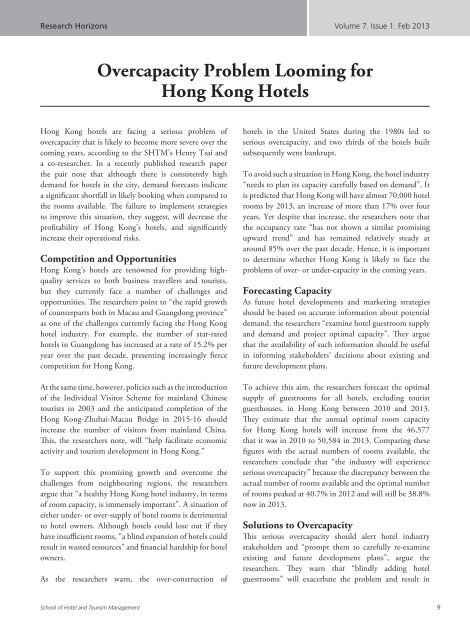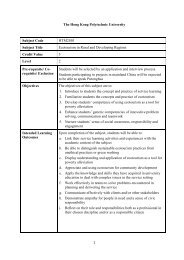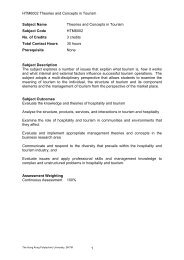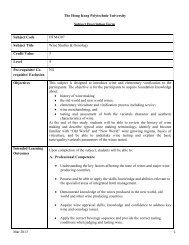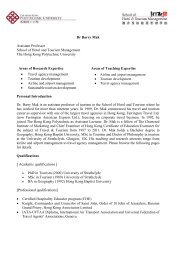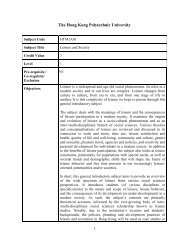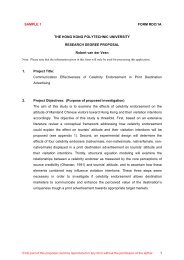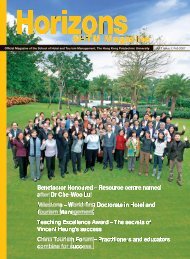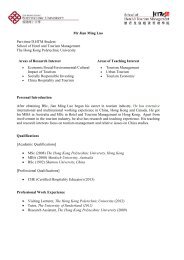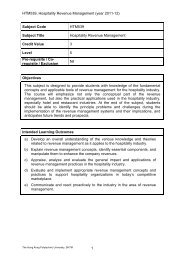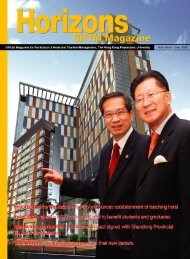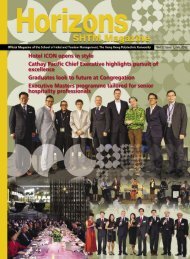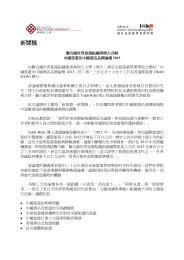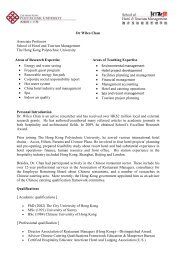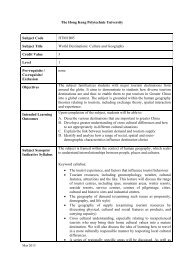Vol 13 Issue 1, February 2013 - School of Hotel & Tourism ...
Vol 13 Issue 1, February 2013 - School of Hotel & Tourism ...
Vol 13 Issue 1, February 2013 - School of Hotel & Tourism ...
Create successful ePaper yourself
Turn your PDF publications into a flip-book with our unique Google optimized e-Paper software.
Research Horizons <strong>Vol</strong>ume 7. <strong>Issue</strong> 1. Feb 20<strong>13</strong><br />
Overcapacity Problem Looming for<br />
Hong Kong <strong>Hotel</strong>s<br />
Hong Kong hotels are facing a serious problem <strong>of</strong><br />
overcapacity that is likely to become more severe over the<br />
coming years, according to the SHTM’s Henry Tsai and<br />
a co-researcher. In a recently published research paper<br />
the pair note that although there is consistently high<br />
demand for hotels in the city, demand forecasts indicate<br />
a significant shortfall in likely booking when compared to<br />
the rooms available. The failure to implement strategies<br />
to improve this situation, they suggest, will decrease the<br />
pr<strong>of</strong>itability <strong>of</strong> Hong Kong’s hotels, and significantly<br />
increase their operational risks.<br />
Competition and Opportunities<br />
Hong Kong’s hotels are renowned for providing highquality<br />
services to both business travellers and tourists,<br />
but they currently face a number <strong>of</strong> challenges and<br />
opportunities. The researchers point to “the rapid growth<br />
<strong>of</strong> counterparts both in Macau and Guangdong province”<br />
as one <strong>of</strong> the challenges currently facing the Hong Kong<br />
hotel industry. For example, the number <strong>of</strong> star-rated<br />
hotels in Guangdong has increased at a rate <strong>of</strong> 15.2% per<br />
year over the past decade, presenting increasingly fierce<br />
competition for Hong Kong.<br />
At the same time, however, policies such as the introduction<br />
<strong>of</strong> the Individual Visitor Scheme for mainland Chinese<br />
tourists in 2003 and the anticipated completion <strong>of</strong> the<br />
Hong Kong-Zhuhai-Macau Bridge in 2015-16 should<br />
increase the number <strong>of</strong> visitors from mainland China.<br />
This, the researchers note, will “help facilitate economic<br />
activity and tourism development in Hong Kong.”<br />
To support this promising growth and overcome the<br />
challenges from neighbouring regions, the researchers<br />
argue that “a healthy Hong Kong hotel industry, in terms<br />
<strong>of</strong> room capacity, is immensely important”. A situation <strong>of</strong><br />
either under- or over-supply <strong>of</strong> hotel rooms is detrimental<br />
to hotel owners. Although hotels could lose out if they<br />
have insufficient rooms, “a blind expansion <strong>of</strong> hotels could<br />
result in wasted resources” and financial hardship for hotel<br />
owners.<br />
As the researchers warn, the over-construction <strong>of</strong><br />
hotels in the United States during the 1980s led to<br />
serious overcapacity, and two thirds <strong>of</strong> the hotels built<br />
subsequently went bankrupt.<br />
To avoid such a situation in Hong Kong, the hotel industry<br />
“needs to plan its capacity carefully based on demand”. It<br />
is predicted that Hong Kong will have almost 70,000 hotel<br />
rooms by 20<strong>13</strong>, an increase <strong>of</strong> more than 17% over four<br />
years. Yet despite that increase, the researchers note that<br />
the occupancy rate “has not shown a similar promising<br />
upward trend” and has remained relatively steady at<br />
around 85% over the past decade. Hence, it is important<br />
to determine whether Hong Kong is likely to face the<br />
problems <strong>of</strong> over- or under-capacity in the coming years.<br />
Forecasting Capacity<br />
As future hotel developments and marketing strategies<br />
should be based on accurate information about potential<br />
demand, the researchers “examine hotel guestroom supply<br />
and demand and project optimal capacity”. They argue<br />
that the availability <strong>of</strong> such information should be useful<br />
in informing stakeholders’ decisions about existing and<br />
future development plans.<br />
To achieve this aim, the researchers forecast the optimal<br />
supply <strong>of</strong> guestrooms for all hotels, excluding tourist<br />
guesthouses, in Hong Kong between 2010 and 20<strong>13</strong>.<br />
They estimate that the annual optimal room capacity<br />
for Hong Kong hotels will increase from the 46,577<br />
that it was in 2010 to 50,584 in 20<strong>13</strong>. Comparing these<br />
figures with the actual numbers <strong>of</strong> rooms available, the<br />
researchers conclude that “the industry will experience<br />
serious overcapacity” because the discrepancy between the<br />
actual number <strong>of</strong> rooms available and the optimal number<br />
<strong>of</strong> rooms peaked at 40.7% in 2012 and will still be 38.8%<br />
now in 20<strong>13</strong>.<br />
Solutions to Overcapacity<br />
This serious overcapacity should alert hotel industry<br />
stakeholders and “prompt them to carefully re-examine<br />
existing and future development plans”, argue the<br />
researchers. They warn that “blindly adding hotel<br />
guestrooms” will exacerbate the problem and result in<br />
<strong>School</strong> <strong>of</strong> <strong>Hotel</strong> and <strong>Tourism</strong> Management 9


